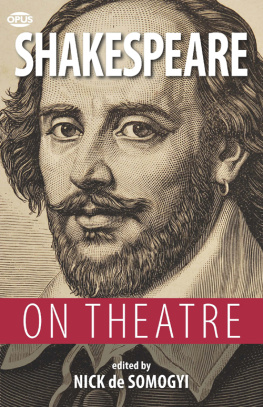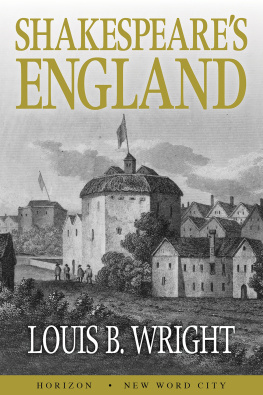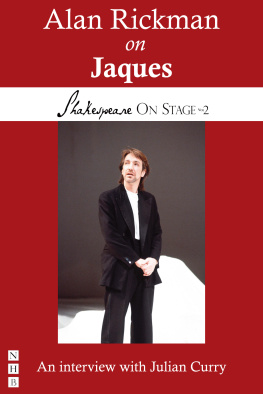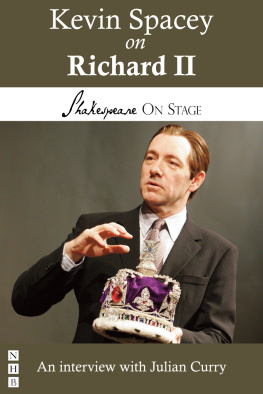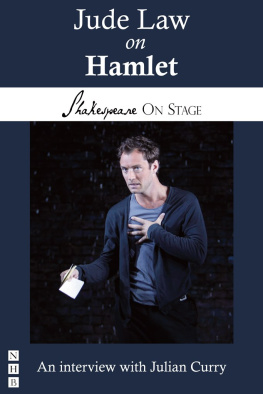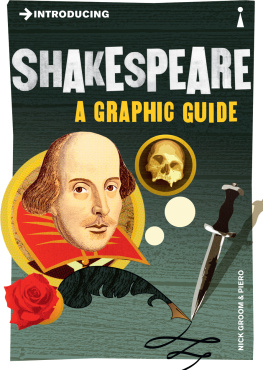Nick De Somogyi - Shakespeare on Theatre
Here you can read online Nick De Somogyi - Shakespeare on Theatre full text of the book (entire story) in english for free. Download pdf and epub, get meaning, cover and reviews about this ebook. year: 2012, publisher: Nick Hern Books, genre: Non-fiction / History. Description of the work, (preface) as well as reviews are available. Best literature library LitArk.com created for fans of good reading and offers a wide selection of genres:
Romance novel
Science fiction
Adventure
Detective
Science
History
Home and family
Prose
Art
Politics
Computer
Non-fiction
Religion
Business
Children
Humor
Choose a favorite category and find really read worthwhile books. Enjoy immersion in the world of imagination, feel the emotions of the characters or learn something new for yourself, make an fascinating discovery.
- Book:Shakespeare on Theatre
- Author:
- Publisher:Nick Hern Books
- Genre:
- Year:2012
- Rating:4 / 5
- Favourites:Add to favourites
- Your mark:
- 80
- 1
- 2
- 3
- 4
- 5
Shakespeare on Theatre: summary, description and annotation
We offer to read an annotation, description, summary or preface (depends on what the author of the book "Shakespeare on Theatre" wrote himself). If you haven't found the necessary information about the book — write in the comments, we will try to find it.
Shakespeare on Theatre — read online for free the complete book (whole text) full work
Below is the text of the book, divided by pages. System saving the place of the last page read, allows you to conveniently read the book "Shakespeare on Theatre" online for free, without having to search again every time where you left off. Put a bookmark, and you can go to the page where you finished reading at any time.
Font size:
Interval:
Bookmark:
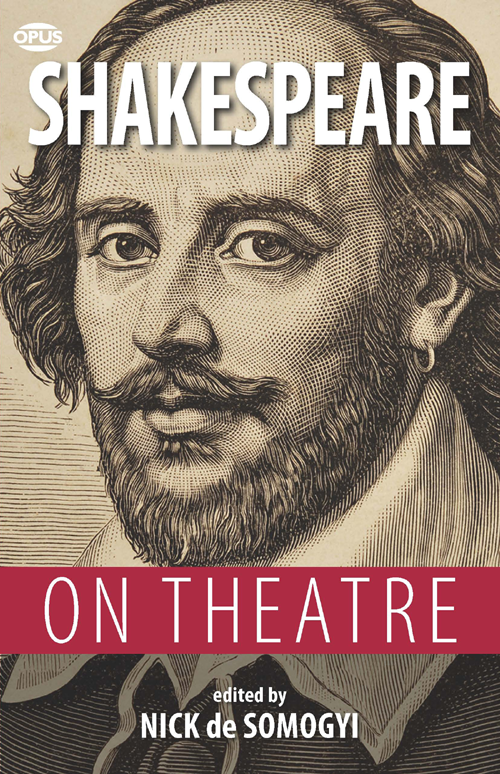
THE OPUS ON THEATRE SERIES
ON THEATRE
edited by
Nick de Somogyi

THE OPUS ON THEATRE SERIES
SHAKESPEARE ON THEATRE
First Published in the United States by OPUS in 2013
Copyright 2012 by Nick de Somogyi
AN OPUS TRADE PAPER ORIGINAL
All rights reserved.
Printed in the United States of America.
No part of this book may be reproduced, or stored in a retrieval system, or transmitted in any form or by any means, electronic, mechanical, photocopying, recording, or otherwise, without express written permission of the publisher.
ISBN: 978-1-62316-032-6
E-BOOK EDITIONS OF THIS OPUS TITLE ARE ALSO AVAILABLE.
By arrangement with Nick Hern Books, London
Publishers Cataloguing-in-Publication Data
Shakespeare on theatre / edited by Nick de Somogyi. 1st US ed. New York : Opus, c2013.
p. ; cm.
(The Opus on theatre series)
ISBN: 978-1-62316-032-6 (pbk) ; 978-1-62316-033-3 (ePub) 978-1-62316-034-0 (Kindle) ; 978-1-62316-035-7 (Adobe PDF)
First published by Nick Hern Books, London (2012).
Includes bibliographical references and index.
Summary: A unique collection of Shakespeares every reflection on the theatre, offering insights into the man, his work, and the world of the Jacobean stage. Publisher.
1. Shakespeare, William, 1564-1616KnowledgeTheater. 2. Shakespeare, William, 1564-1616Dramatic production. 3. Shakespeare, William, 1564-1616Stage history. 4. Theater. 5. DramaTechnique. 6. Theater in literature. 7. TheaterEnglandLondon-HistorySources. I. De Somogyi, Nick. II. Series.
PR3034 .S43 2013
822.3/3dc23
1304

A Division of Subtext Inc., A Glenn Young Company
44 Tower Hill Loop Tuxedo Park, NY 10987
Publicity: E-mail
Rights enquiries: E-mail
All other enquiries: www.opusbookpublishers.com
OPUS is distributed to the trade by The Hal Leonard Publishing Group
Toll Free Sales: 800-524-4425
www.halleonard.com
in memoriam
GEOFFREY BURNSTONE
(19252009)
The worlds a Theatre: the earth a stage,
Placd in the midst, where both the prince and page,
Both rich and poor, fool, wise man, base and high,
All act their parts in lifes short Tragedy.
Our lifes a tragedy: those secret rooms
Wherein we tire us are our mothers wombs.
The music ushring in the play is mirth
To see a man-child brought upon the earth.
That fainting gasp of breath which first we vent
Is a Dumb Show; presents the argument.
Our new-born cries, that new-born griefs bewray,
Are the sad Prologue of thensuing play.
False hopes, true fears, vain joys, and fierce distracts
Are like the music that divides the Acts.
Time holds the glass, and when the hours outrun,
Death strikes the Epilogue, and the Play is done.
Francis Quarles, On the Life
and Death of a Man (c. 1630)
1 ACTOR. Gods of the theater, smile on us.
2 ACTOR. You who sit up there, stern in judgment, Smile on us.
1 ACTOR. You who look down on actors
BOTH. And who doesnt?
Stephen Sondheim (1974)
W hatever else he was or wasnt and bookshelves groan with contending theories William Shakespeare (15641616) was a working man of the theatre to his core. If, to quote the maxim he perfected, All the worlds a stage And one man in his time plays many parts, then the world of the theatre in which he lived and worked supplied him with a lifetime of roles. The stage-struck boy, watching in wonder the outlandish spectacle of touring productions. The young father drawn to the amateur dramatics of local maygames and revels. Then, talentspotted by a later touring troupe, the industrious jobbing actor, hitching his fortunes to the grinding wagon of provincial rep, and learning the tricks of this gradually lucrative trade. Next, in step with his growing confidence as an actor, his precociously impressive skills as a textual fixer for the increasingly creaky melodramas of the repertoire an improviser of verse and plot no less impressive than the showier repartee of the company Clown. In time, of course, the Londoner, and after sharing the modern duties of dramaturg, prompter, and ASM another new title to go with his burgeoning success as a junior co-author: upstart. Despite being disparaged by the Oxbridge lite in 1592 as a provincial jack of all trades, as well able to bombast out a blank verse as the best of them, Shakespeares parts proliferated: bestselling love-poet (1593); founder-member, with the actor Richard Burbage and the clown Will Kemp, of the Lord Chamberlains Men (1594); published and publicized playwright (1598); shareholder and artistic director at the Globe theatre (1599); the best and chiefest of our modern writers (1601); principal dramatist of the Kings Men, and celebrity box-office gold (1603); financial and artistic investor in the Blackfriars theatre (1609); senior co-author, mentor, and consultant (161314); and eventually, after a lifetime spent in a profession legally defined as little better than that of rogues and vagabonds, the part he may have cherished most, the one with which he described himself in his will (1616): gentleman. But when, in 1602, an officer at the College of Heralds expressed doubt over Shakespeares right to his coat of arms, the condescending term he used probably in fact best defines the mans lifelong rank, profession, or occupation: Shakespear ye Player.
Shakespeare was a player in nearly all the definitions available in the Oxford English Dictionary (OED) gambler, competitive contestant, professional (as opposed to gentleman), financial speculator, sexually successful individual, respected, or influential person but chiefly, of course, in the specifically theatrical sense that enabled all the others throughout his lifetime: A person who acts a character on the stage; a dramatic performer, an actor. From the late 1580s to the early 1610s, Shakespeares life was regulated by the demands made on him as a dramatic performer. His calendar years were divided into theatrical seasons, themselves irregularly organized (by politics or plague) between Londons playhouses, its various aristocratic households, and the slog of provincial touring. The odd month or so was presumably snatched back home in Stratford, but his London weeks were determined by an exhausting schedule of all-but daily performance, whether for public profit at the theatre, or private reward at court. The diary of his London days was principally governed by the demands of the public theatres in which he worked the Theater, the Curtain, the Rose, and the Globe-where, open to the skies, performances largely depended on daylight, the three hours or so of their typical duration therefore starting at around two oclock in the afternoon. (The candle-light of the indoor Blackfriars theatre was later to extend the available playing time, for a richer clientele, into dark winter afternoons and evenings.)
The rival public theatres seem to have competed for their trade by presenting a different, often new, play every day (while regularly rotating performances of the staple favourites) a schedule that must have dictated a punishing rgime for its actors. With his afternoons devoted to performance, Shakespeares mornings must often have involved group rehearsals on the unattended stage sorting out a new plays blocking, for example, rehearsing its duels, dances, battles, and special effects, or else simply refreshing the collective memory of an earlier production required for its revival that afternoon. Days were long, and those evenings that were free from the demands of private performance at court or elsewhere would presumably have been as much taken up with the constant grind of learning lines and in Shakespeares case writing and revising them as the riotous boozing and wenching of popular imagination. Playing was as it has always been extremely hard work.
Font size:
Interval:
Bookmark:
Similar books «Shakespeare on Theatre»
Look at similar books to Shakespeare on Theatre. We have selected literature similar in name and meaning in the hope of providing readers with more options to find new, interesting, not yet read works.
Discussion, reviews of the book Shakespeare on Theatre and just readers' own opinions. Leave your comments, write what you think about the work, its meaning or the main characters. Specify what exactly you liked and what you didn't like, and why you think so.

